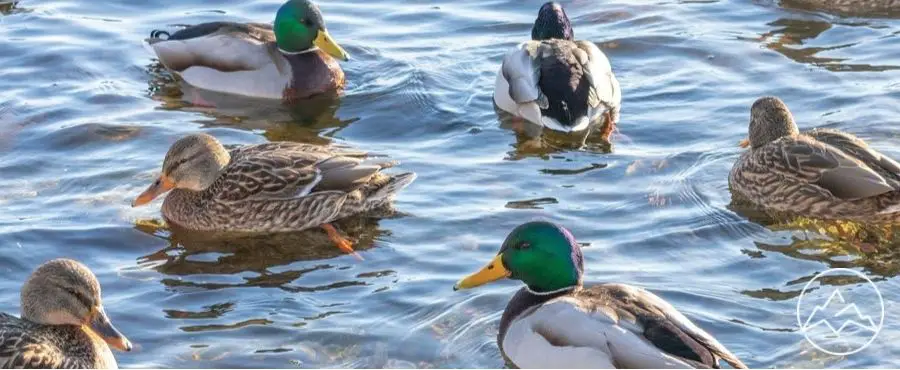Duck hunting takes skill, but there are ways to tilt the odds in your favor. The below duck hunting tips are great ways to help you learn how to duck hunt and improve your odds of success, so read them well and keep them in mind when planning the next expedition.
The right gear matters
Of course, having the right gear is critical. Any successful duck hunt will largely rely on the quality of your equipment. After all, you wouldn’t bring subpar tools to any other job or hobby. Hunting gear needs to be taken as seriously as gear for any other sport.
The most important gear is as follows:
- A good gun you’re comfortable with
- A good load for said gun
- A suitable camo suit, waders, and hunting boots
- Decoys
- Waterfowl stamp and hunting license
- A good duck call
To start, you’ll need to make sure that you have a good gun. For many beginners, a 12gauge shotgun is a great place to start. Other, more experienced hunters use an automatic rifle to take down their target more quickly.
Regardless of whatever kind of gun you use, just make sure that you’ve practiced with it and are comfortable using it in a real hunting scenario.
Make certain that you choose the right load, too. The best shots for duck hunting are usually made of tungsten, iron, or bismuth alloys. These combine great stopping power with good range: both important aspects when trying to hit far-away birds.In addition, don’t neglect to look for a good camo suit. What to wear when duck hunting is just as important as the gun you bring. Ducks, along with many other types of birds, have fantastic vision. They can spot you from far away unless you’re suitably camouflaged with the environment.
Make sure that you have a good duck decoy or two, as well. Drawing in your target waterfowl will take more than just luck. The right decoy spread can bring your target right into the perfect firing angle. These are also a great addition when dealing with more difficult late-season waterfowl hunting.
Finally, make sure that you have an appropriate waterfowl stamp. This will be combined with a typical hunting license, and you can rest assured that the extra fees will go to effective conservation efforts. These efforts will ensure that the land and fowl can still be enjoyed by future generations.
Specific skills to hone in on
Although gear is important, it’s only as good as the duck hunter using it. Sharpening your skills will lead to more successful hunts and prevent you from heading home with disappointment.
First and foremost, learn how your chosen gun feels and fires before heading out onto a real hunt. It’s critical to test out your chosen weapon at variable ranges to see how it performs. Hunters that are comfortable with their weapon can land shots that newbies will never imagine.
Doing this requires practice. Be prepared to spend plenty of hours learning the ins and outs of your weapon before taking it into the field. Although this may slow you down initially, you’ll be more well-prepared than hunters that leap into a hunt without the required expertise.
In addition, spend some time understanding the various duck species you might be hunting. Not all ducks behave the same way, and you’ll need to identify the correct targets to avoid getting into legal trouble, anyway.
Great hunting locations
Duck hunts are best done in optimal locations. Before starting, consider whether or not you’ll be hunting in a specific area or if you’ll be scouting a few locations to try to find the ducks organically. Both options have their advantages.
It’s a good idea to have a specific spot in mind, such as a particular marsh or wetland, but also have some backup options if the ducks aren’t there at the moment. It might take some time to learn where your chosen ducks like to congregate, but you’ll get better with experience. Study a map and plot out potential spots before scouting in advance.
To have better luck finding duck hunting spots, try to find places where there’s optimal food for them to graze on. Ducks can often be found in these types of locations, trying to score some easy meals.
Finally, remember to place the sun at your back! Many good shots have been thrown off by an inopportune glare at the worst moment.
You may also like: Our picks for the best hunting blinds
Optimal hunting times
When to hunt is just as important as where. Evenings are decent enough, but the morning is the best time to hunt ducks. It’s ideal to head out to your hunting spot before dawn. Birds are very active in the early hours of the morning, and the morning light will be perfect illumination for getting good shots.
As the warmth of the morning raises the ambient temperature, ducks will take flight and seek cooler areas. This is your moment.
While it’s true that ducks are active at other times of day, this activity is simply not comparable to morning rushes.
Essentially, the hours of around 5 AM to 9 AM are usually perfect for most duck hunting expeditions, especially mallards.
FAQs About Duck Hunting
What supplies should I bring with me when duck hunting?
How do I choose the right call to use?
What is a good way to identify different species of ducks in flight?
Is it better to hunt during early morning or late afternoon?
Should I camouflage my boat and decoys for duck hunting?
Wrapping up
Following the above duck hunting tips will help ensure that your next duck hunt is totally successful. Even duck hunting for beginners can yield great results!
Good luck and thanks for reading!




You made a good point when you explained that a successful duck hunt will depend on the quality of the equipment that you are using. In addition to that, I would think that it would be important to transport the equipment you are using in a safe manner. It seems like it would be a good idea to have a high-quality backpack to carry things in when hunting.